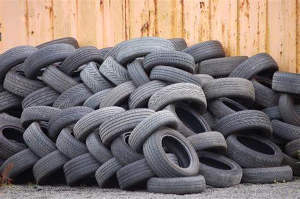New Technology for Recycling Tyres

Motor trade tyre dealers maybe interested to read SUEZ Recycling and Recovery UK and Pyrum Innovations AG have announced their joint venture to construct the first-ever pyrolysis plant for recycling end-of-life tyres, utilizing Pyrum’s patented technology.
The UK plant, which will be established through a one-year partnership, aims to extract reusable components from scrap tyres to produce new ones!
The agreement entails SUEZ’s responsibility for identifying an appropriate location for the plant and initiating the necessary approval procedures.
The facility will consist of three pyrolysis reactors, enabling the recycling of approximately 20,000 tonnes of end-of-life tyres generated annually from the motor trade.
In the UK alone, over 50 million tyres are discarded each year, and this collaboration seeks to mitigate the resulting waste.
Currently, only 13.4 million of these tyres are repurposed as alternative fuel, while the remaining tyres are either shredded and transformed into a material known as crumb for sports fields or playgrounds, sent for energy recovery, or disposed of in landfills.
This new patented pyrolysis reactor technology aims to revolutionize this process. Through an innovative approach, the reactors will extract high-quality raw materials from tyres, resulting in a 72% reduction in CO2 emissions compared to existing recycling methods.
At the new facility, the tyre recycling process will involve the separation of tyres into their raw materials, including oil, carbon black, and pyrolysis gas.
The carbon black will be reused in the production of new tyres, while the oil will be recycled for other purposes. Additionally, the pyrolysis gas derived from the old tyres will be utilized to power the plant itself.
SUEZ reports that more than half of the tyres used by private and motor trade vehicles in the UK are currently not recycled.
It is important to note that maintaining proper tyre condition is crucial for optimal vehicle performance, efficiency, and safety.
Tyres should generally be replaced after approximately 20,000 miles for the front tyres and 40,000 miles for the rear tyres, but this can vary based on factors such as tyre quality, road conditions, and maintenance.
According to Michelin, it is recommended to have tyres inspected by a professional at least once a year after five years of use.
If the tyres remain on the vehicle for ten years since their manufacturing date, they should be replaced as a precautionary measure.
The price range of tyres varies significantly from tyre dealers, with the most expensive options costing several hundred pounds more than budget tyres.
The suitability of different tyre options depends on driving habits, mileage, and tyre maintenance. Premium tyres may provide better grip and performance for high-mileage drivers on high-speed roads, while mid-range brands offer a good compromise for those with more moderate usage. Budget brands are also suitable for everyday use.
Regardless of the tyre type, proper tyre care is essential to maximize performance and safety. Underinflated tyres increase rolling resistance, leading to higher fuel consumption and reduced performance during braking, cornering, and acceleration, especially in wet conditions.
It is important to maintain the recommended tyre pressure as indicated in the vehicle’s manual or on a sticker typically located inside the door. By not carrying out these procedures regularly could invalidate your motor insurance policy.
Worn-down tyres pose a risk to vehicle safety, and driving with tyres that have a tread below the legal limit is illegal.

The minimum legal tread depth is 1.6mm across the central three-quarters of the tyre, and failure to meet this requirement can result in a penalty of £2,500 per tyre and three penalty points on the driving license. It’s worth noting that tyre performance deteriorates once the tread depth falls below 3mm.
John Scanlon, Chief Executive Officer at SUEZ recycling and recovery UK, said: “This agreement marks an exciting milestone for SUEZ as leaders in the development of a more circular, resource efficient UK economy.”
Pascal Klein, CEO of Pyrum Innovations AG, continued: “The European rollout of our unique technology continues to progress.
The first site will now be identified as soon as possible. We will then work together to complete the approval process with the local authorities.”
Although this is still in its planning phase over the next year, there are opponents to the technology. A study by Loughborough University in 2019 challenged the impact of pyrolysis.
Study leader Dr Andrew Rollinson concluded: “This paper shows that self-sustaining pyrolysis, creating energy from waste, is thermodynamically unproven, practically implausible, and environmentally unsound.
“The result is we are putting more CO2 into the atmosphere by recycling waste via pyrolysis than if we simply burnt it.”







